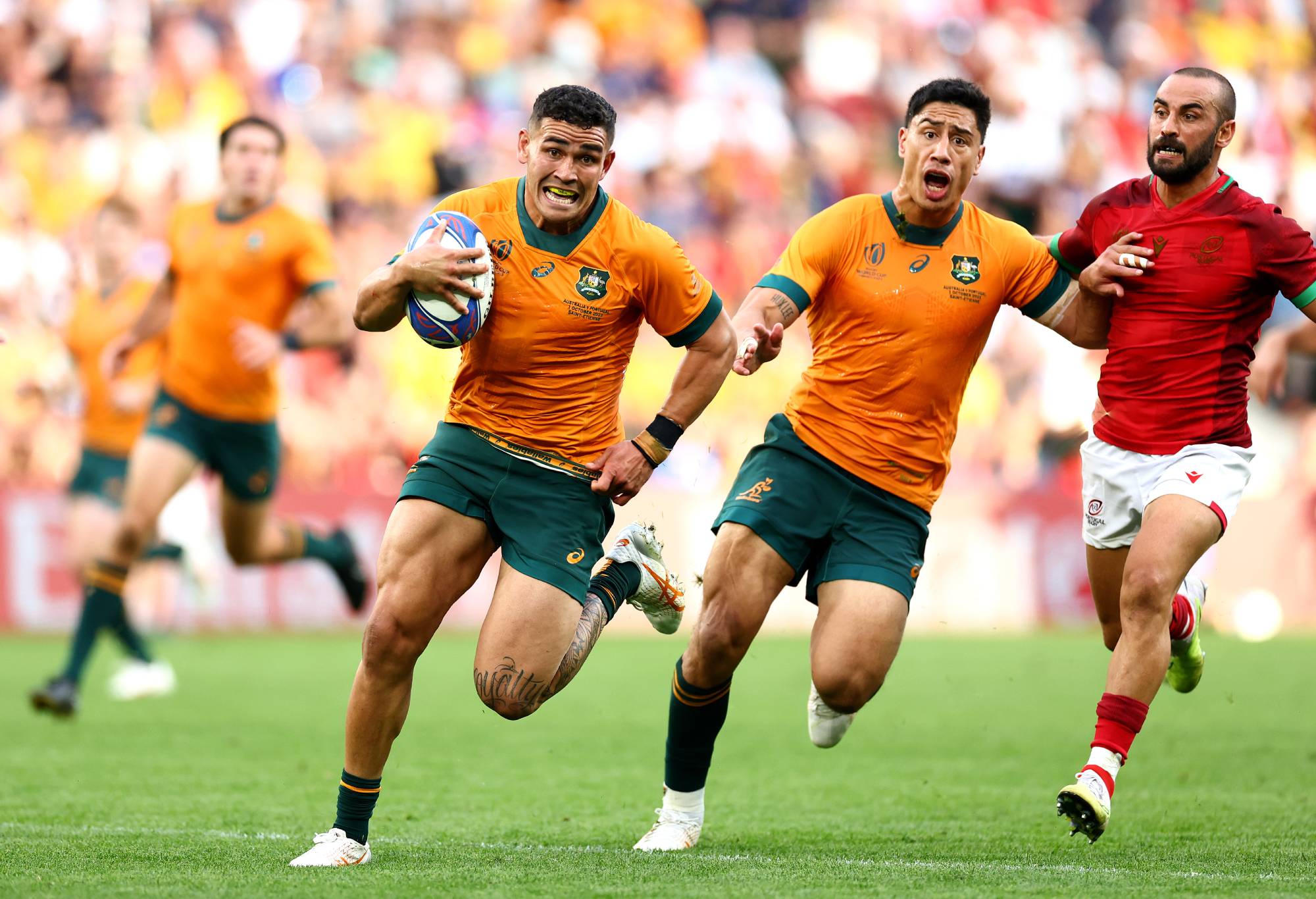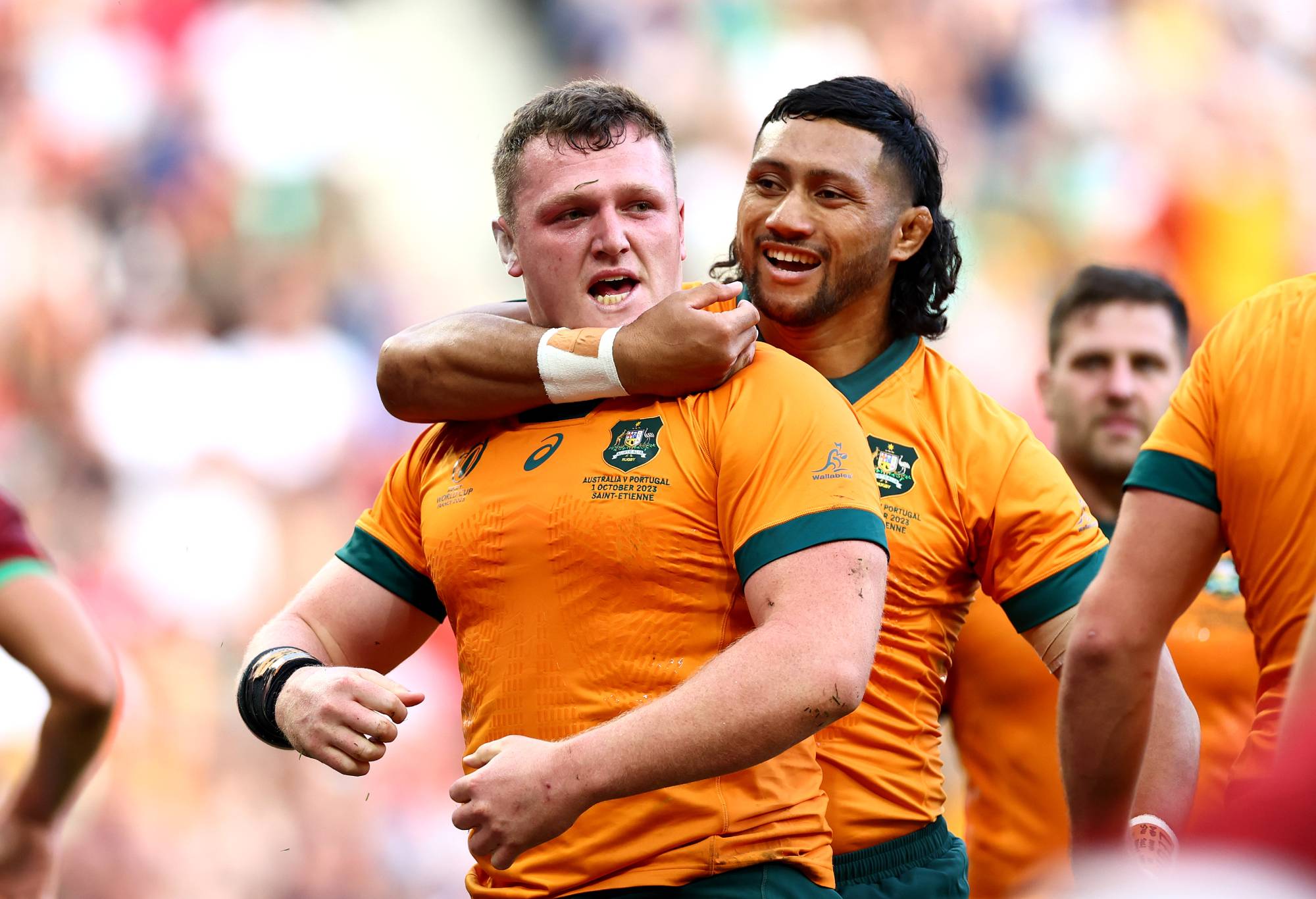Like having to endure Chinese water torture, the Wallabies 2023 World Cup is still not strictly over. Even though, despite their 34-14 win against Portugal, everyone knows it is.
The World Cup will go on without Australia, with an overriding sense that ‘less Eddie’ is a good thing. Almost everyone knows that the winner will be one of four ‘big’ sides, but nobody really knows which one. That too, is a good thing.
Meanwhile, nobody knows what is going to happen to Australian rugby, and that, most definitely, is not a good thing.
Any number of ‘solutions’ have been put forward in the last week, but without the core problems being clearly identified and articulated, little of it makes any sense.
Australian rugby’s problem is indeed a complex, interwoven mesh of macro and micro factors that, when they all come out of the wash, are manifested in dwindling participation rates, audience engagement, and lack of success at elite level.
On one hand it is pointless to bemoan 20 years of mismanagement, because seeking to apportion blame in that way takes the focus away from forward-looking solutions.
But the past is also critically important, because economic truths, historical impediments and entrenched, parochial positions need to be properly understood before they can be worked around.

Izaia Perese of Australia breaks with the ball whilst under pressure from Samuel Marques of Portugal. (Photo by Chris Hyde/Getty Images)
At the heart of the matter is Australian rugby’s inability to understand how the advent of professionalism impacted upon rugby, and how the second phase of professionalism – different from the first – continues to shape the sport.
Much is made of Australia’s World Cup wins in 1991 and 1999, and its close run second place in 2003. This era was also populated by regular Bledisloe Cup victories and Super Rugby titles and finals appearances.
Back then the game was professional in name, but not so much in practice. What was succinctly described to me by Ireland flyhalf and professional coach, David Humphries, as players doing exactly what they did as amateurs – rugby, golf, drinking – just getting paid for it.
Australia’s generation of players – and coaches – was as good as any. Or, in many cases, better.
But because Australia failed to anticipate how professional rugby might evolve, failed to understand basic population and market demographics, failed to invest and future-proof accordingly, and failed to work hard enough, it has been left behind.
Other rugby nations got serious about developing pathways and high-performance programs, for players and coaches. And northern hemisphere nations with bigger ‘rugby populations’ were able to become rich – relative to Australia – leveraging off popular traditional competitions and hefty broadcasting rights deals.
In professional sport – not just rugby – money invariably filters into the top of the sport. In horse racing, the richest owners buy the best horses and win more races. Think of the imbalance between the top and bottom F1 teams.
Because rugby doesn’t have equalisation measures, nations and clubs who want to swim with bigger fish, but who don’t have the means – like Australia – find themselves increasingly squeezed.

Angus Bell of Australia celebrates his first Test try. (Photo by Chris Hyde/Getty Images)
As of this weekend, Australia’s elite netballers are all without contracts, after pay talks with Netball Australia again fell over. Despite healthy junior participation, the Diamonds being reigning world champions, and a high-quality domestic super league, netball can’t come to grips with the fact that there aren’t sufficient corporations and paying fans who will pay enough money to sustain the sport at the professional level.
Sound familiar? Remember that Australian rugby’s problem isn’t just an imbalance compared to other rugby nations but, like netball, competition from other domestic sports, who soak up playing talent, sponsorship and broadcast rights money.
In that context, the failure last week of UK rugby club Jersey, put suddenly into liquidation, is a salutary lesson for anyone who believes in some kind of professional or semi-professional solution built around 20 Sydney and Brisbane rugby clubs.
As rugby clubs, they are all special; each and every one. But viable professional entities they are not. They can never have enough money, qualified personnel or first-class facilities. Nor will Rugby Australia have the cash to spoon feed them on the never-never.
As sure as night follows day, the lion’s share of the money they do get will be spent enticing players to and from each other’s clubs; an understandable but ultimately pointless exercise.
This is the same realisation hitting New Zealand and their NPC, where things are now dominated by a small handful of provinces, while the rest either live within their means and accept the lack of success that goes with that, or teeter on the precipice of bankruptcy.
Essentially, professionalism demands two things of Australian rugby. That it generates as much revenue as it can, so that it can sustain both its high-performance programs and grass roots/community programs; and that it applies that money as efficiently as possible.
Right now, Rugby Australia is failing badly on both counts.
Before any solution can be contemplated, stakeholders must first agree on which rugby is professional – and make it the best it can be – and which rugby is amateur. Clarity.
Anything half-baked, in between, is fraught with danger. Because it uses up money that could be better used elsewhere, and because it fills people with false hope that this is a way forward.
Everywhere there are consequences and opportunity costs. Poor performances at the top feed into diminishing sponsor and broadcasting revenue streams. Elite players can’t be held in Australia and there are insufficient funds to sustain a high-quality domestic competition for men and women.
Withdrawing from Super Rugby (even if that were contractually possible) so as to allow Australia to hibernate in a domestic competition that would provide the certainty of an Australian winner, would divorce Australia even more from global professional development, and hasten a slide even further down the rankings than today’s 10th position.
Every dollar used to entice a player to rugby from the NRL is a dollar not spent on a ‘boots on the ground’ program – such as Melbourne’s ‘Academy Movement’ – that identifies the state schools holding kids from families where there is a historic rugby interest, and ties them into a professionally operated rugby and academic program.
For Australian rugby to progress, it is essential that everyone sings from the same hymn sheet. A degree of centralisation is essential, and it is fair to say that all of the states recognise this and are prepared for this.
But for this to happen, it requires a level of trust in Rugby Australia, that it has the capability and genuine intent to work with all stakeholders in the best interests of the game.
Under the current leadership of chairman Hamish McLennan, this trust is non-existent. Not just because of the Eddie show, although that is part of it. Not just because of the Suaalii and Crichton shows, although that is part of it too. And not just because prospective investors have been turned off from investing in Australian rugby.
There is cautious optimism from the states that CEO Phil Waugh understands the issues and has a genuine intent to tackle them. But that goodwill does not extend to his chairman.
Even yesterday, McLennan was trying to shift the conversation towards his relationship with News Corp executives and the prospect of bringing Fox Sports back into the picture to provide competitive tension for rugby’s next round of broadcast rights.
If some vague potential for renewal of a relationship with a toxic partner is all it takes to keep the Rugby Australia board in the chairman’s corner, then perhaps there really is no hope.
Having too often made things about him, it is time for McLennan to make things about the game. Save the board and the states the trouble of calling a special general meeting to oust him, and walk away.
Finishing pool C with a win was the least that the Wallabies players deserved; as inconsistent as ever, but putting in plenty of effort and enough decent patches of play, and scoring five tries in the process.
After a long barren spell, they even managed a lineout maul try, but the sight of two players sitting alongside each other in the sin bin was something more familiar.
For their part, Portugal showed they are an exciting, emerging nation, prepared to have a crack, albeit lacking tactical nous and finishing polish; typical of ‘tier two’ sides.
Also in pool C, in what was by far the craziest match of the tournament, Georgia once again showed their ability to create try-scoring opportunities was matched only by their inability to finish them off.
To be fair, referee Karl Dickson robbed them of one, with a forward pass call that, by the standards of what has been let go in this tournament, felt brutally harsh.
Fiji meanwhile, were a mess, rocked by the Georgian’s defensive intensity, again unable to execute consistently at lineout, lucky to go in at half-time only 9-0 down.
In the end, Fiji wore the plucky Georgians down, to win by 17-12. But it was a close-run thing, Georgia streaming towards the try-line on a thrilling final play that could have stolen the match.
I’ve no doubt Fiji will grow from this experience; all good sides need to become comfortable with ‘winning ugly’, and no matter how scrappy things were in the first half, they deserve credit for playing to their strengths in the second, and scraping out a result.
New Zealand are no longer under the radar, having smashed Italy by 96-17 on Friday, in a result few people saw coming. In a way, they are the opposite of Fiji; carrying forward a fluid performance like that one will be very difficult, if not impossible, to replicate in a high-pressure quarter-final.
But that’s one thing about World Cups; no matter how you plan, sometimes you just have to take what you’re given and work with that.
That’s the proposition for the Wallabies this week. Destiny out of their own hands, they have to turn and up and train hard for a match they almost certainly won’t even play.






























































































